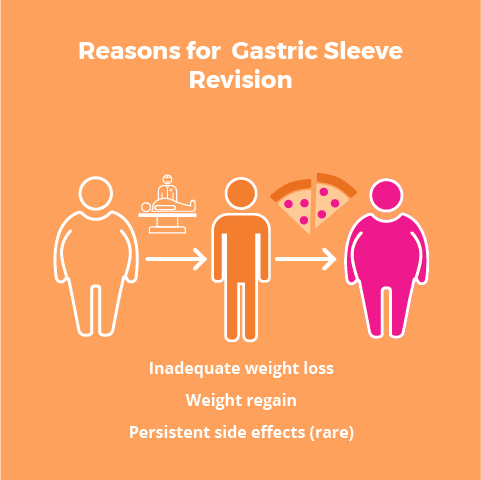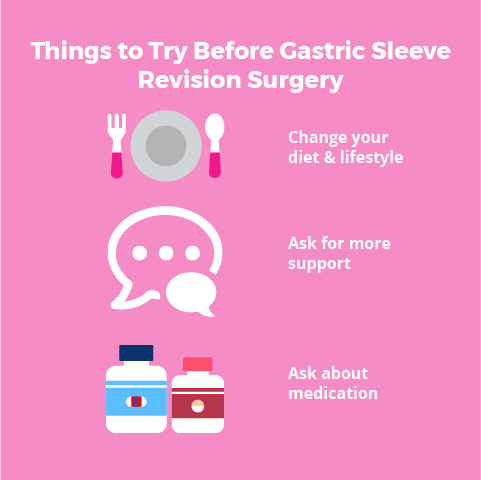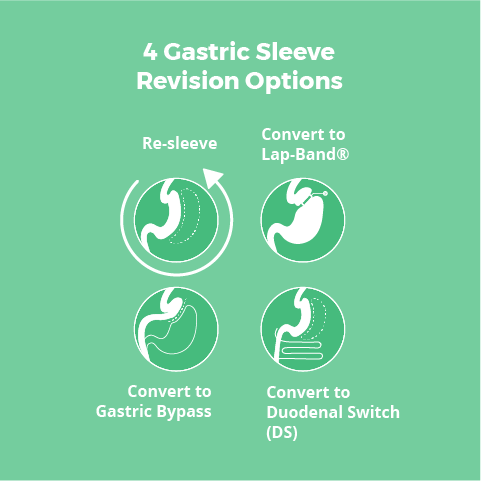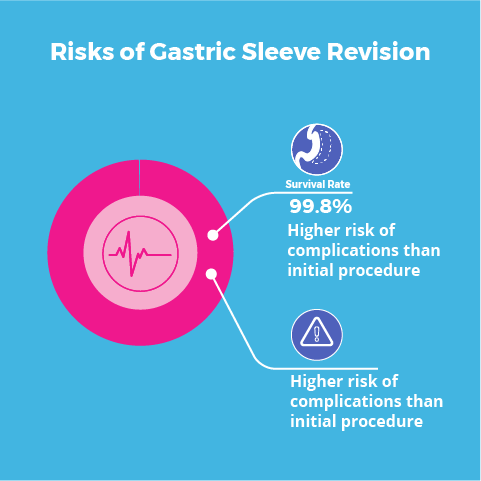There are 4 gastric sleeve revision surgery options for addressing inadequate weight loss, weight regain, or persistent side effects:
- A conversion to a duodenal switch (DS)
- A conversion to a gastric bypass
- Re-sleeve
- A conversion to a Lap-Band
Read the sections below to learn more about gastric sleeve revision options.
TABLE OF CONTENTS
Click on any of the topics below to jump directly to that section
- Reasons for Revision
- Things to Try Before Revision Surgery
- 4 Gastric Sleeve Revision Options
- Risks of Gastric Sleeve Revision
- Find a Gastric Sleeve Revision Surgeon

SECTION SUMMARY:
- You have not lost enough weight
- You have regained too much weight
- Your persistent side effects have not gone away (rare)

After 7 years, approximately 19.9% of gastric sleeve patients will have undergone revisional surgery (1). The most common reasons for gastric sleeve revision surgery are:
- Not enough weight loss
- Weight regain (“weight recidivism”)
Side effects like gastric reflux can also be a reason but are much less common (2).
Weight regain and side effects can begin anywhere from 18 months to 6 years after gastric sleeve surgery (3).
Inadequate Weight Loss
The average gastric sleeve patient loses weight at the following pace:
- 3 months: about one-third of excess weight
- 6 months: about half of excess weight
- 12 months: up to 70% of excess weight
If your weight loss is much different than this, contact your surgeon right away.
Slow weight loss is usually caused by poor diet and lifestyle choices.Your surgeon will be able to provide the additional diet, lifestyle, and behavioral support you need. The sooner you start fixing diet and lifestyle issues, the more likely you will be to get back on track (4) (5).
However, some patients don’t lose enough weight because the surgeon did not perform the procedure properly (6). Surgeon errors leading to inadequate weight loss after gastric sleeve surgery include:
- Not recognizing and fixing a hiatal hernia during surgery (a common issue associated with obesity where part of the stomach pushes up through the diaphragm muscle)
- Not removing all of the upper part of the stomach (gastric fundus)
- Not removing enough of the stomach
Gastric sleeve surgery works by making the patient feel full sooner while eating and by reducing the amount of hunger-causing hormones secreted by the stomach. The above surgeon errors can prevent or lessen the effects of one or both of these.
Weight Regain
As many as 3 out of every 10 gastric sleeve patients eventually experience weight regain. The amount of regain varies widely, ranging from a few pounds to all of the weight lost (7) (8). For these patients, the weight begins to creep back anywhere from 18 months to 6 years after surgery and is the result of:
- The stomach stretching out, making patient hungrier while eating and causing them to eat more
- The amount of hunger-causing hormones going back up (e.g., ghrelin) (9) (10)
- Not enough follow-up support for the patient
- Patient not adhering to recommended diet & lifestyle changes
Stomach stretching as a result of overeating is the most common reason for weight regain after gastric sleeve surgery (11).
For patients who gain back weight, the amount varies widely by patient and timeframe, ranging from only a small amount of weight to all of it (12) ( 13).
To learn more, see our Weight Gain After Gastric Sleeve page.
Persistent Side Effects
Although it’s relatively rare, gastric sleeve revision surgery may be required in the case of persistent side effects like acid reflux and hiatal hernia (14). Approximately 2% of revisional surgeries are due to acid reflux symptoms that haven’t responded to dietary changes or the use of medication (15).
SECTION SUMMARY:
- Change your diet & lifestyle
- Ask for more support
- Ask about medication

Regardless of your reason for wanting a gastric sleeve revision, surgery should be the last resort. Just like your initial surgery, it’s time-consuming, costs money, carries risk, and isn’t guaranteed to work long-term.
You should explore the options below before you get serious about surgery.
Change your diet & lifestyle
Two of the most common reasons for inadequate weight loss or weight regain after gastric sleeve surgery are (16) (17):
- Consuming the wrong foods/liquids or too much foods/liquids
- Not exercising enough
Review our Gastric Sleeve Diet Guidelines and Exercise Guidelines and compare them to your current habits. If you’ve let yourself slip, make a concerted effort to get back on track before considering surgery.
Talk with your surgeon and their dietitian about helping you get on a strict dietary regimen to get back on track.
Start & Maintain a Diet Journal
Diet journals are directly associated with more weight loss (18). A well-kept journal will help you to:
- Set goals and record progress
- Plan your meals ahead of time
- Prevent “cheating” on your meal plans
- Shop smartly – take your journal with you to the grocery store and only buy the foods that you have planned
If you haven’t been journaling, give it a try before exploring revision surgery options.
Ask for more support
It’s nearly impossible to succeed on your own. If haven’t done so already, talk with your surgeon about specialists and local support groups.
Talk with a Specialist
Your surgeon should have several gastric sleeve specialists either in-house or nearby who are ready to help, including:
- Dietitian
- Psychologist
- Personal Trainer
Set up an appointment with your surgeon to discuss your options.
Join a Gastric Sleeve Support Group
If you’re having a tough time sticking to your diet and exercise goals on your own, join a local support group of other gastric sleeve patients. Your surgeon’s office should be able to refer you to one.
In addition to the invaluable encouragement and support you’ll receive from others who know your challenges, support groups also result in more weight loss. Several studies have shown that regular weight loss support group attendees lose as much as 12% more excess weight than patients who do not attend (19).
See our Weight Loss Surgery Support Group page for more information.
Ask about medication
Medication is usually not effective for gastric sleeve patients who have regained weight, but it’s worth discussing with your surgeon.
For example, one study of gastric bypass and gastric sleeve patients undergoing revision surgery for weight regain or inadequate weight loss found that the medication Topiramate made patients more likely to lose weight (20).

SECTION SUMMARY:
- Convert to duodenal switch (DS)
- Convert to gastric bypass
- Re-sleeve
- Convert to Lap-Band

Following are the 4 gastric sleeve revision surgery options in order of the most long-term weight loss:
- Duodenal switch
- Gastric bypass
- Re-sleeve
- Lap-Band
Duodenal switch and gastric bypass surgery are more complex procedures that carry a higher risk of complications. The trade-off is more long-term weight loss.
Review details about each option below, then talk with your surgeon about which is the best option for you.
Cost of Revision Surgery
The cost of gastric sleeve revision surgery depends on:
- Insurance – if your policy covers bariatric surgery, revision surgery will be covered as long as you meet the same body mass index (BMI) requirements as your initial procedure (35+ BMI with health conditions, 40+ without health conditions) or if you have a side effect like reflux that makes a revision medically necessary. If you have insurance that covers bariatric surgery, out-of-pocket costs for gastric sleeve revision surgery will be around $3,500.
- Which revision surgery you have – if you don’t have insurance, total gastric sleeve revision procedure costs will be 25% to 50% higher than the original procedure. For example, the average cost of gastric sleeve in the U.S. is $19,000. So the average cost of a re-sleeve ranges from $23,750 to $28,500.
Convert to Duodenal Switch (DS)
Gastric sleeve was originally the first step in the two-step duodenal switch (DS) procedure. Converting from a gastric sleeve to a DS is more like “fulfilling” the DS procedure than “converting” to it.
A gastric sleeve revision to a duodenal switch involves 3 parts:
- Ensuring that the stomach is the appropriate size (remove excess stomach if it has stretched out)
- Rearranging the intestines
- Remove the gallbladder
Part 1 makes the patient feel full sooner while eating and reduces the amount of hunger-causing hormones secreted by the stomach. Parts 2 and 3 cause the patient to absorb far fewer calories and minerals. As a result, DS patients lose a significant amount of weight quickly, and lose up to 70% or more of their weight over the long-term.
The downsides of the DS are:
- More challenging procedure, so fewer surgeons perform it
- More diligent diet and surgeon follow up required because of higher risk of vitamin deficiency
On the positive side:
- DS surgery results in a higher amount of long-term weight loss than any other procedure (26) (27)
- Very low risk of weight regain
Cost of converting from a gastric sleeve to a duodenal switch:
- With Insurance: About $3,500
- Without Insurance: $33,750 to $40,500, on average
See our Duodenal Switch Patient Guide for more information about the DS procedure.
Convert to Gastric Bypass
Just like converting to a duodenal switch (DS), performing Roux-en-Y (RNY) gastric bypass surgery is a relatively “natural” progression from a failed gastric sleeve.
During a gastric sleeve revision to gastric bypass:
- The top portion of the stomach is separated from the bottom portion, leaving a smaller “gastric pouch” connected to the esophagus
- The intestines are rearranged (albeit in a different fashion than DS)
However, unlike the DS procedure:
- The gallbladder is not removed
- More digestive juices are maintained
The result is rapid and significant long-term weight loss, although not as much as after DS because gastric bypass is only mineral-malabsorptive (and not calorie-malabsorptive).
Gastric bypass positives include:
- Significant long-term weight loss, second only to DS surgery (29) (30) ( 31)
- Low risk of weight regain
- Less risk of vitamin deficiency than DS
Cost of gastric sleeve to bypass revision:
- With Insurance: About $3,500
- Without Insurance: $30,000 to $36,000, on average
See our Gastric Bypass Surgery Patient Guide for more information about the gastric bypass procedure.
Re-Sleeve
Performing another gastric sleeve surgery, also called a “Re-sleeve,” is an option for patients with inadequate weight loss or weight regain as a result of the smaller sleeve stomach stretching out (21) (22):
The main downside of the Re-Sleeve is that the stomach could stretch out again if you don’t change your behavior or eating habits (23).
On the positive side:
- Re-sleeve is less technically challenging to perform than converting to gastric bypass or duodenal switch
- It should result in a similar amount of weight loss as the average initial gastric sleeve procedure (24) (25): up to three-fourths of your excess weight within 1 to 2 year
- Prevent “cheating” on your meal plans
- Shop smartly – take your journal with you to the grocery store and only buy the foods that you have planned
Cost of a Re-Sleeve:
- With Insurance: About $3,500
- Without Insurance: $23,750 to $28,500, on average
See our Gastric Sleeve Patient Guide for more information about the gastric sleeve procedure.
Convert to Lap-Band
A gastric sleeve revision to a Lap-Band involves:
- Wrapping a band around the top portion of the stomach. Inside the band is a tube (like the inside of a bicycle tire) that can be filled and unfilled to increase or decrease the level of restriction. A tube connects the band to a silver-dollar-sized port just below the skin.
- Visiting the surgeon several times to adjust the fill amount of the band. The fill amount must be just right in order to achieve the proper level of food restriction.
Lap-Band surgery has had inconsistent short-term results and a high rate of failure, so most gastric sleeve revision surgeons do not recommend it.
Those who do offer it cite the following positives:
- Lower risk of short-term complications than the other gastric sleeve revision procedures (28)
- It is reversible
Cost of converting from a gastric sleeve to a Lap-Band (“band over sleeve”):
- With Insurance: About $3,500
- Without Insurance: $18,750 to $22,500, on average
See our Lap-Band Surgery Patient Guide for more information about the Lap-Band procedure.
SECTION SUMMARY:
- You will have the same high survival rate as initial procedure: 99.8%
- There is a higher risk of complications than from initial procedure

While gastric sleeve revision surgery mortality rate is very low and comparable to the initial sleeve procedure (32), it may carry a higher risk of complications due to (33) (34) (35):
- Surgeons have less experience performing revision surgeries on the smaller gastric sleeve stomach than they do on the normal stomach for the initial sleeve procedure
- Scarring from the previous surgery adds complexity to the procedure
For information about how to minimize the risk of complications, see our Gastric Sleeve Complications page.
SECTION SUMMARY:
- You can ask a local bariatric practice for a free insurance check or cost quote
- You can attend a free in-person seminar or an online webinar offered by a local weight loss surgeon
- You should schedule a phone or in-person consultation (both often free), if you are interested in learning more about weight loss surgery



